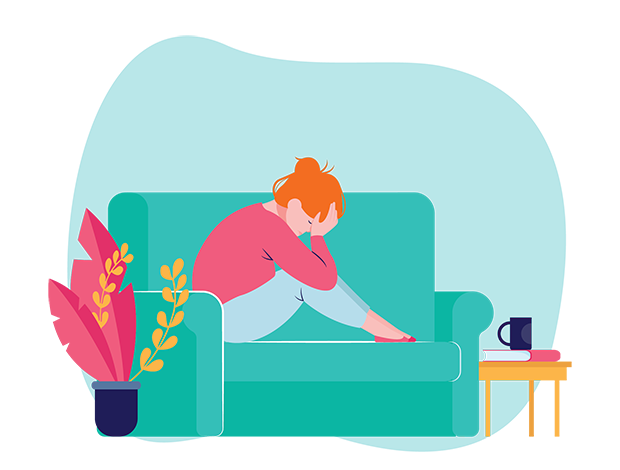Anorexia Nervosa
TREATMENT IN ATLANTA
Eating disorders are complex illnesses that rob people of their good physical and mental health. When faced with one, many people don’t feel sure about where to turn to get the focused care they need. Anorexia treatment centers should employ skilled therapists who understand how to get to the root causes of an eating disorder and help guide the person to recovery. Atlanta Integrative Psychiatry understands how to provide the necessary support for people with anorexia through the use of different types of therapy provided in a compassionate and private setting.


What is Anorexia Nervosa?
Anorexia nervosa is an eating disorder that can impact people from all walks of life. When someone is anorexic, they focus on losing weight and maintaining an unhealthy low body weight. The person often does not see their physical self clearly and believes they take up more room than they do. As a result, they use drastic measures to lose weight, such as crash diets or going for long periods without eating. These behaviors are often done in private and hidden for long periods of time.The results may be mistaken for someone simply on a diet or a sign of a person’s vanity, neither of which is correct. Eating disorders are often an attempt to feel some sort of control when a person otherwise feels a lack of it. It may have to do with past or current unresolved issues or a lack of ability to use healthy coping skills.
Signs of Anorexia
Someone in need of getting help from anorexia treatment centers exhibits signs that they are in trouble. Common behavioral signs include:
- Always on a diet or trying to lose weight
- Constantly weighing themselves
- Obsessively counting calories
- Avoiding food groups, such as sugar or carbohydrates
- Use of diet pills, laxatives, diuretics, or enemas
- Chronic state of being underweight
- Hiding food
- Wearing baggy clothes to hide weight loss
Physical signs of anorexia include:
- Chronic state of being underweight
- Pale or gray skin
- Dizziness
- Fainting
- Hair loss
- Low blood pressure
Anorexia vs Bulimia
Anorexia and bulimia differ primarily in the behaviors associated with each eating disorder. Anorexics may sometimes overeat or binge eat, but their main behaviors involve restricting their food intake. They eat miniscule amounts of food at a time or try to go as long as possible without eating. On the other hand, bulimics often engage in binge eating large amounts of food which leave them feeling uncomfortable and ashamed. They then use behaviors such as self-induced vomiting, laxatives, and diuretics in an attempt to rid themselves of the food.

Eating disorders are classified as mental health disorders which are treatable through the use of therapy and other professional and psychological interventions. People can and do recover from anorexia, although the process does take time. The sooner they enter treatment, the less damage they are likely to incur to their physical and mental health.
Eating disorders are dangerous mental illnesses because they put people at risk of physical health problems and early deaths. Approximately 30 million Americans have had an eating disorder at some point during their lifetimes. When anorexia goes untreated, the person is five to six times more likely to die than those who do not have the condition.
Many people with anorexia begin their treatment in a residential program where they live for several weeks and receive initial treatment in a round-the-clock setting. Once they complete this program, they can transition to outpatient anorexia treatment centers. Atlanta Integrative Psychiatry accepts clients who are medically stable and able to participate in their therapy sessions.
We perform a thorough assessment to understand the issues, both past and present, that may have contributed to someone developing anorexia. This allows us to determine which types of therapy will provide the best results for the person. Psychotherapy offers concrete ways for people with anorexia to understand how to change their negative thought patterns and reframe how they see food, body size, and themselves. Any necessary prescription medications can be provided to help alleviate symptoms of co-occurring conditions such as anxiety or depression. We also provide nutrition counseling to help each person understand what their unique nutritional needs are and how to meet them.
How Long Does It Take to Recover from Anorexia?
There isn’t a one-size-fits-all answer for how long it takes for someone to recover from anorexia. Residential anorexia treatment centers typically work best if the individual remains there for 60 days or longer. Once they transition to outpatient care, treatment can continue for several months or a few years, depending on the severity of the eating disorder. As the person makes progress in their recovery, they will need fewer therapy sessions. The goal is for therapists to help the individual reach the point where they are able to handle any temptations to relapse into eating disordered behaviors without professional support.
Get Help at Our Anorexia Treatment Centers Today in Atlanta, GA
Are you looking for an anorexia treatment center that employs therapists trained to help people recover from eating disorders? Atlanta Integrative Psychiatry has a staff of experienced clinicians who provide compassionate care in a modern, comfortable environment. We work with each person to understand their specific needs and set treatment goals with them. We teach people to understand what contributed to developing anorexia and how to overcome it.
If you would like to talk to someone about scheduling an appointment with us, contact us today. We can answer any questions you have about our program and how it can benefit you.
You are not alone. You deserve to get help.
Atlanta Integrative Psychiatry is an Industry leader in mental health treatment . Our team of top medical experts specialize in dual diagnosis treat and are committed to ensuring that each patient is treated as an individual.
Call us today, we're avialable 24/7.




